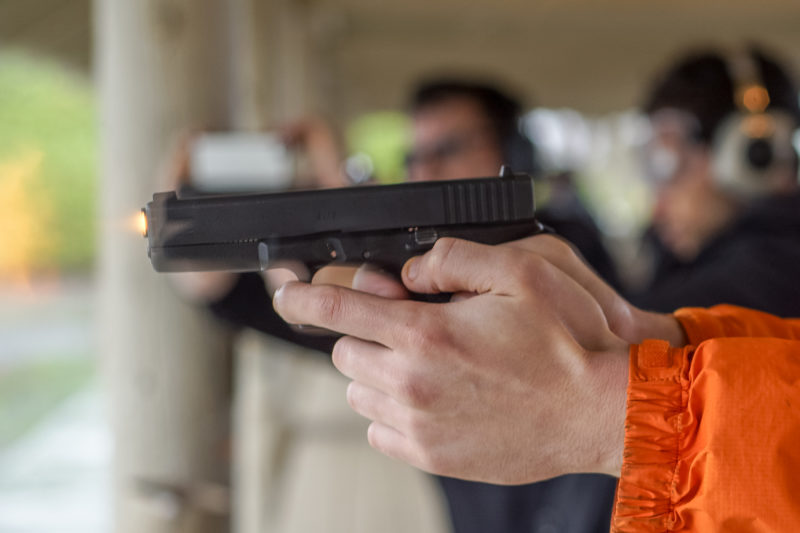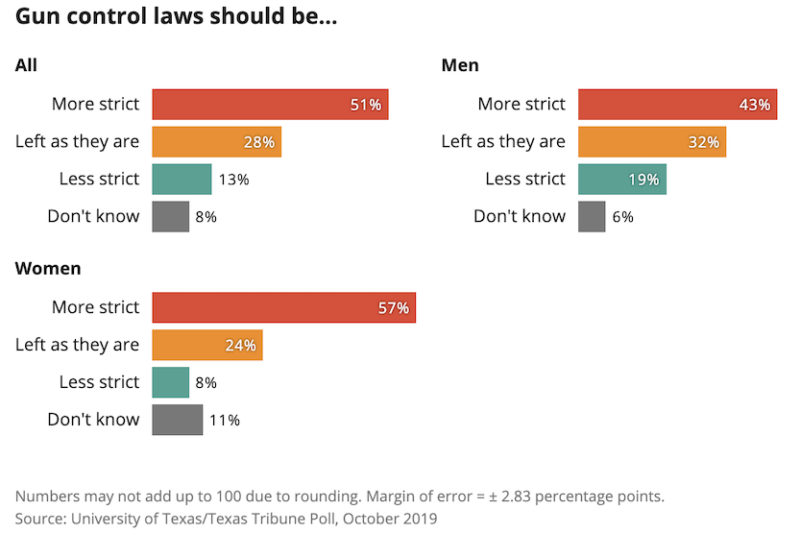The Uphill Climb for Stricter Gun Laws in Texas
By Madi Donham
Reporting Texas

Courtesy of Peretz Partensky/Flickr
A Republican state representative from Odessa — which witnessed the third mass-shooting tragedy nationwide in a single month last year — filed the first gun-safety-related bill of the upcoming 87th Legislature.
On Aug. 31, 2019, just months after the 86th Texas Legislature strengthened the right to own and carry guns in the state, a gunman killed seven people and injured 25 before police killed him in a movie parking lot in Odessa.
“Action must be taken to confront the scourge of gun violence in Texas,” Brooks Landgraf announced following the Midland-Odessa shooting. His bill would create a mechanism to notify Texans if there’s an active shooter within 50 miles..
A spokesman for the Texas State Rifle Association said it has no plan to take a position on the bill. Gun safety activists feel indifferent, and said a mass shooting policy will not cure daily gun violence.
There are 830,109 licensed firearms in Texas — the largest number of registered weapons in the country. The state issued more than 300,000 state gun licenses in 2019, with sales rising during the coronavirus pandemic. From 2014 to 2018, an average of 3,288 people died by guns in Texas. Suicides accounted for 62% of those deaths.
The Midland-Odessa gunman opened fire on civilians from a moving, stolen vehicle — an uncommon tactic in mass shootings. Landgraf’s proposal, which he calls the Texas Active Shooter System, would operate similarly to the Amber Alert notification system and calls for a collaboration between the Texas Department of Public Safety and the Department of Transportation.
“Everyone I’ve spoken with agrees that we have a need for this statewide active shooter alert system,” Landgraf said during his re-election campaign. “The goal of HB 103 is to save lives and assist first responders.”
Texans support common-sense gun safety reform, according to a poll conducted by the University of Texas and Texas Tribune in October 2019.
Representatives of Moms Demand Action and Texas Gun Sense, organizations driven by evidenced-based policies to reduce gun violence, welcome Landgraf’s bill but say the Legislature must do more.
Moms Demand Action has volunteer-filled chapters in every state. The grassroot movement rose in response to the 2012 Sandy Hook Elementary shooting — when a 20-year-old gunman killed 26 people, including 20 first graders.
Michelle Herskowitz, a 58-year-old Houston native, joined Moms Demand Action as a volunteer after hearing a mother speak at a women’s march about her son being shot in an act of daily gun violence — which includes domestic violence, crime, unintentional shootings and suicides.
“We have had four mass shootings in Texas in recent years that are horrific — four out of the 10 deadliest mass shootings in the U.S. — but they really make up a very small percentage of firearm deaths in Texas,” Herskowitz said.
“If we were looking at [Landgraf’s bill] to be the answer, we’d be leaving out more than 3,000 deaths a year,” she added. .
Survivors of gun violence founded Texas Gun Sense out of frustration with the escalating gun violence in Texas. The organization advocates and educates on a state level.
The group was at the Capitol or working on gun-related measures every day during the last legislative session. Nonetheless, lawmakers passed bills that made Texas less safe, according to the organization’s analysis of the 2019 session.
Gyl Switzer, executive director of Texas Gun Sense, keeps a running list of gun-related bills. She counted 50 gun-related pre-filed bills in addition to Landgraf’s Texas Active Shooter System.
The majority of pre-filed gun-related legislation concerns the carrying of weapons and increasing criminal penalties for certain conduct — plus designating June as Firearm Safety Awareness Month.
The Texas Active Shooter system makes sense at first glance, Gyl said after grimly joking that gun safety bills go to the Texas Legislature to die.
“There was some breakdown in communication that appeared in the Midland-Odessa area, so on the surface it seems like a good thing, but it’s not a comprehensive bill that impacts gun violence across the board in a positive way,” Gyl said.
“But I don’t complain about good — even if it’s fairly narrow,” she added.
Andi Turner, legislative director for the Texas State Rifle Association, said it does not plan to take a position on Landgraf’s bill. “Keep in mind that we are only a month into pre-filing and legislators have about three months to go to file legislation,” Turner said.
The association is focusing on fighting firearm sale restrictions, gun confiscation and efforts to expand safe gun storage, Turner said.
Texas Gun Sense’s three priorities for the 2021 session are universal background checks, red flag laws and the safe storage of firearms, Switzer said.
Moms Demand Action works to keep guns out of the hands of people who shouldn’t have them. Its goal is to stop gun violence before it happens with red flag laws, secure storage and background checks on all gun sales — which are prone to loopholes for online and gun show sales, Herskowitz said.
“We anticipate to fight some of the same battles, but I will say things are changing — we’ve already seen the tone change on gun safety in Texas over the past years,” Herskowitz added.
In the aftermath of the mass shootings in 2019 in Midland-Odessa and El Paso, where a gunman killed 22 people in a Walmart, Gov. Greg Abbott issued eight executive orders focused on law enforcement responding to and preventing shootings. His office added that legislative solutions are still needed.
“I will continue to work expeditiously with the legislature on laws to keep guns out of the hands of dangerous criminals, while safeguarding the Second Amendment rights of law-abiding Texans,” Abbott said at the time.
In September 2019, Texas House Speaker Dennis Bonnen and Lt. Gov. Dan Patrick created House and Senate committees to recommend legislative solutions to mass gun violence. Bonnen’s House Select Committee on Mass Violence Prevention and Community Safety was required to submit a preliminary assessment within 90 days of its creation, produce periodic progress reports and submit a final report, but the coronavirus pandemic has slowed its work.
